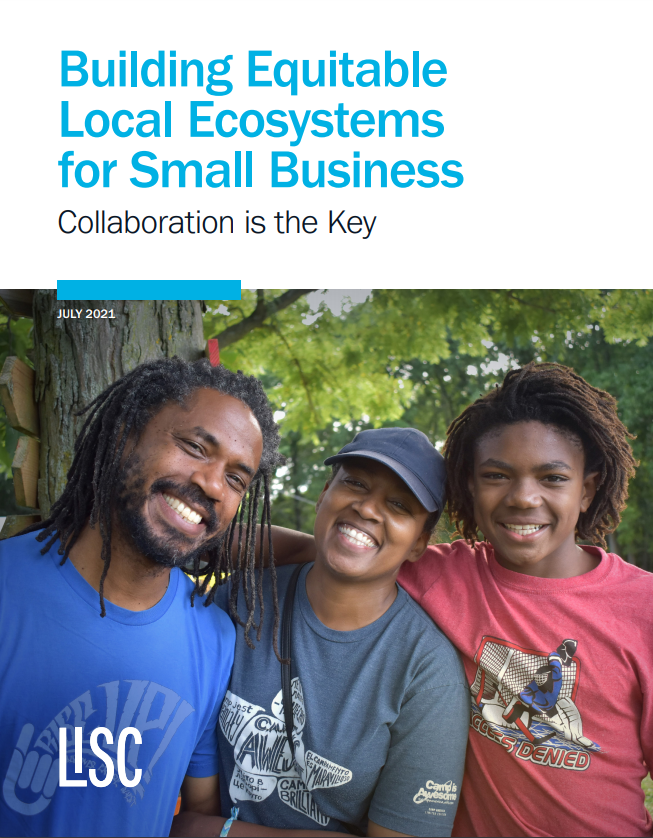Since the onset of the pandemic, LISC has equipped 16,000 small business owners with relief and resilience grants. But to foster opportunity and long-term resiliency for all entrepreneurs who confront entrenched inequities, including people of color, women, immigrants and refugees, and people with lower incomes and wealth, we need a robust universe of small business “ecosystems”: the network of capital, services, and supports that every enterprise needs to get on its feet and grow.
It’s no secret that the Covid-19 pandemic has taken a disproportionate toll on people of color, and in underinvested places—in the form of higher death rates, steeper unemployment, and deeper distress among the small BIPOC-owned businesses so critical to community vitality.
Many of these mom-and-pops found themselves unable to shift to remote work and short on cash reserves, with their customers hard hit, too. They’ve suffered sharper revenue declines and more closures than enterprises owned by white people.
But it’s not too late to set the stage for a fairer small business recovery. In fact, the time is now to focus on creating more equitable local ecosystems for small business over the long run. We must identify and eliminate disadvantages that have nothing to do with an entrepreneur’s grit and talent and everything to do with unequal access to what makes up a small business ecosystem: the network of capital, services, and supports that every enterprise needs to get on its feet and grow.
This, we believe, is the way to foster opportunity and long-term resiliency for all entrepreneurs who confront entrenched inequities, including people of color, women, immigrants and refugees, and people with lower incomes and wealth.
And it will take concerted collaboration in local markets across the country. In a new brief, Building Equitable Local Ecosystems for Small Business, LISC’s economic development team offers a guide for how cross-sectoral groups can analyze local opportunity gaps and implement data-driven strategies to redress them. We hope local stakeholders—from business development organizations (BDOs) to small-business lenders to community advocates and government representatives—will begin or intensify this work as soon as possible.
During the Covid-19 crisis, LISC put out $240 million in emergency grants to over 16,000 small businesses, the vast majority of them owned and operated by people of color (over 85%) and/or women (over 55%). We developed a database of over 800,000 business in need. We also quickly deployed $4.8 million to augment the work of 130 BDOs, local organizations that connect small businesses with technical assistance, training, and affordable capital.
In the process we got an in-depth look at the obstacle course, rife with barriers and pitfalls, that disadvantaged entrepreneurs must run to launch, grow, and sustain their businesses. And we’ve thought deeply about what’s needed to transform these conditions on a systems level.
Not surprisingly, inequitable access to capital emerges as a primary issue. Most business owners tap personal or family funds to start and expand their businesses. That means the nation’s yawning racial (and gender) wealth gap underpins disparities in entrepreneurship. To build more equitable ecosystems, lenders and other stakeholders will need to design a variety of flexible, affordable financing products that match the needs of small businesses of all shapes and at every stage. Outright grants and credit enhancement to lower risk for lenders will also be important.
In a survey of our small-business grant recipients, most said they wanted technical assistance to navigate the complex challenges of the pandemic, but only one in four was able to get it. Prospering, well-connected businesses, on the other hand, typically can access expert advice and services just by picking up the phone. A key way for communities to broaden opportunity in their local business ecosystems is to support a variety of culturally competent, high-touch BDOs that can coach and equip business proprietors who, like our grantees, might otherwise have to go it alone.
One of our most important takeaways has been that lenders, BDOs, and other stakeholders accomplish more when they’re connected in a community of practice that’s committed to equity. This allows coalition members to strategically increase their individual service capacity, make streamlined client referrals across the network, design systems-level interventions, and collectively track results and course-correct.
America’s small-business community, the very backbone of our national economy, has always been diverse, and it is becoming more so. In the past five years, for instance, women of color have launched businesses at 4.5 times the rate of the overall population. This energetic startup activity holds the potential to generate wealth for BIPOC families and communities, significantly bridging America’s racial wealth gap.
LISC’s urgent project is to help cultivate local ecosystems where BIPOC entrepreneurs aren’t held back by systemic barriers, but can readily access the tools that all businesses need to grow and prosper. This is a critical requisite for social justice, and also for economic efficiency and sustainable growth. Every community has a stake in unleashing the strengths of diverse small businesses, because we all have a stake in their success.
Stay tuned for more:
In coming weeks LISC’s economic development team will be introducing a suite of materials to help communities build more equitable ecosystems for small business, including a series of webinars and a step-by-step playbook co-produced with Next Street.
ABOUT THE AUTHOR
 Bill Taft, Senior Vice President of Economic Development
Bill Taft, Senior Vice President of Economic Development
Bill leads the expansion of LISC’s inclusive economic development efforts in its 37 local programs by investing in people, places, and businesses. Bill has been with LISC since 2005, initially serving as LISC Indianapolis’ Executive Director, later as Program Vice President, and now as Senior Vice President for Economic Development. Under Bill’s leadership, LISC Indianapolis invested over $240 million to leverage $1 billion of investment in the core urban neighborhoods of Indianapolis. Prior to that, Bill was President of Southeast Neighborhood Development, Inc. (SEND) for 14 years, overseeing the early phases of revitalizing the Fountain Square area of Indianapolis. Bill holds an undergraduate degree from Cedarville University and a master’s from Ball State University’s College of Architecture and Planning.

Building Equitable Local Ecosystems for Small Business
A new LISC brief offers insight and guidance to stakeholders looking to forge robust small business ecosystems in historically under-invested communities, the same communities that have also borne the brunt of the pandemic's economic fallout.
